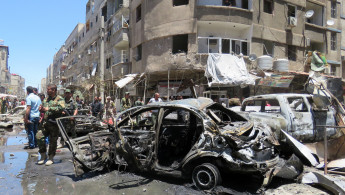Syria: NGO reveals new details of war crimes commited during 2014 massacre in Damascus
An investigation led by the NGO Huquqyat concluded that a number of crimes were committed out by Assad-affiliated militias during an event known by the local community in the south of Damascus as the Ali Al-Wahsh massacre in 05 January 2014.
Huquqyat, an NGO that specialises in legal accountability processes in Syria, concluded that murder, torture, arbitrary detention, enforced disappearances, and other crimes against humanity took place during events occurring on 5 January 2014 at the Ali Al-Wahsh checkpoint in the south of the Syrian capital.
The crimes were carried out by local Shia militias affiliated with Bashar Al-Assad’s regime.
The Ali Al-Wahsh checkpoint was opened following a series of negotiations between local groups and regime forces as a humanitarian corridor for local civilians to leave a besieged rebel-held area in the south of Damascus.
Thousands of Syrian civilians nine years ago walked towards the checkpoint in the hope of leaving southern Damascus, which had been besieged by the Assad regime since July 2013. Residents of the area had little to no access to food, water and medicine, compelling them to attempt to leave the area.
Civilians first walked towards an internal checkpoint in Yalda, and from there, they walked down Ali Al-Wahsh street towards Sayyeda Zainab, where the checkpoint was located, and where the alleged crimes took place.
According to the investigation, civilians were ordered to wait at the checkpoint and were divided according to their gender and age. Armed men then proceeded to collect mobile phones, IDs and other belongings, before putting them in bags.
Some women - who were at the front of the crowd - were ordered to enter a nearby mosque in which they were forcibly held. The rest of the women followed suit, while more civilians approached the Al-Wahsh checkpoint.
According to some uncorroborated witness testimonies, the Shia militia men were seen beating up detained men arbitrarily, while others believe that some men were executed
Huquqyat is continuing to examine allegations of killings, beatings, disappearances and later abuses occurring in the context of subsequent detention
A small number of men were released from detention, and death certificates were issued to some families. However, the whereabouts of the many men who disappeared on 5 January 2014 remain unknown.
Despite the findings, Huquqyat remains determined to seek further information in a bid to hold those responsible accountable for their actions.
More than half a million people have been killed during the Syrian conflict, which began in 2011 following the brutal suppression of peaceful protests by the Assad regime.
The war, which has now entered its second decade, has left millions more displaced, with more than 80 percent of Syrians living in abject poverty and dire conditions.
This article has been edited to reflect some accuracy issues.





 Follow the Middle East's top stories in English at The New Arab on Google News
Follow the Middle East's top stories in English at The New Arab on Google News
![The UAE is widely suspected of arming the RSF militia [Getty]](/sites/default/files/styles/image_330x185/public/2024-11/GettyImages-472529908.jpg?h=69f2b9d0&itok=Yauw3YTG)
![Netanyahu furiously denounced the ICC [Getty]](/sites/default/files/styles/image_330x185/public/2024-11/GettyImages-2169352575.jpg?h=199d8c1f&itok=-vRiruf5)
![Both Hamas and the Palestinian Authority welcomed the ICC arrest warrants [Getty]](/sites/default/files/styles/image_330x185/public/2024-11/GettyImages-2178351173.jpg?h=199d8c1f&itok=TV858iVg)